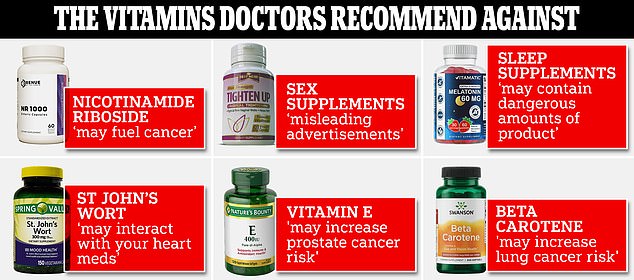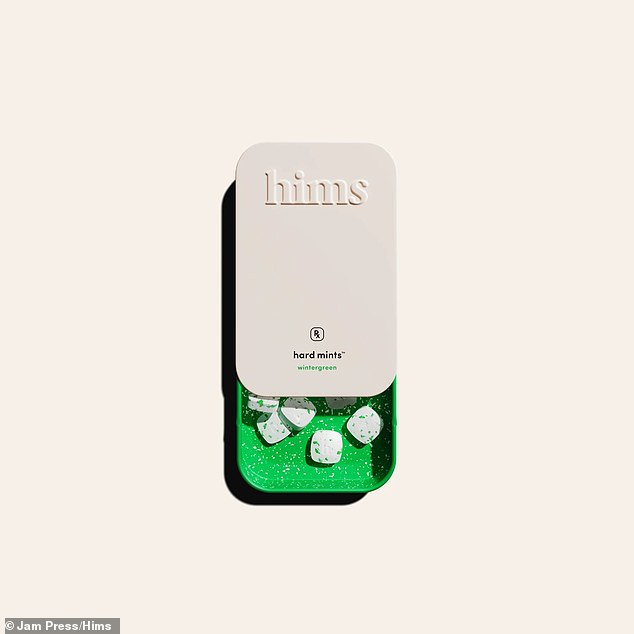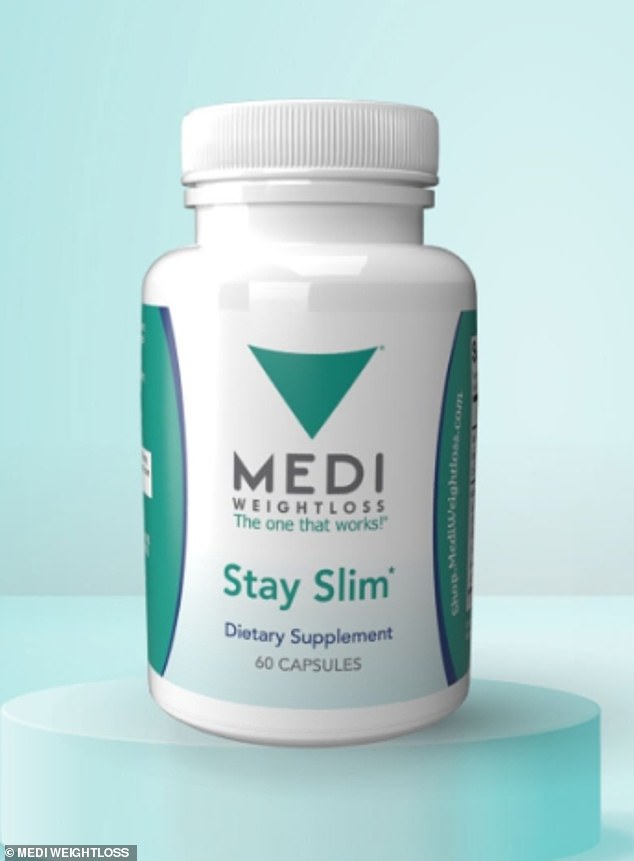We’re a nation of pill-poppers, so it’s no surprise that vitamins and supplements have become a $50 billion-a-year industry.
An estimate 70 percent of Americans take some type of supplement every day.
But doctors warn that not only are a large number of products fake, but they could actually harm health rather than improve it.
A new study suggested that taking nicotinamide riboside (NR), a form of vitamin B3, could increase the risk of developing aggressive forms of cancer.
The 70-cent tablets are touted for their anti-aging properties and have gained widespread popularity in recent years among wellness influencers.

The study, led by Elena Goun, a chemistry professor at the University of Missouri, found that the popular supplement could help cancer spread.
It has been shown that NR promotes cell growth. When Professor Goun fed it to cancer cells in the laboratory, she discovered that they could use it as a powerful fuel to spread throughout the body.
This, according to the study, could increase the risk of people developing difficult-to-treat forms of breast cancer and increase the risk of the disease spreading to the brain and other parts of the body.
However, the study authors caution that finding this link does not definitively mean that these supplements cause cancer; People might need to take a large amount of the supplement for it to have a serious effect on their body, for example.
“This sheds light on how unregulated the supplement industry is and how little we know about the long-term effects of many supplements,” Professor Goun said.
“Some people take them (vitamins and supplements) because they automatically assume that vitamins and supplements only have positive health benefits, but very little is known about how they actually work,” he said.
This is not the only supplement that has been linked to unfortunate results.


Some supplements claim to support sexual health
A review of 450,000 Americans conducted by researchers at Johns Hopkins University found that multivitamins did nothing to reduce the risk of heart disease or cancer.
“Most supplements do not prevent chronic disease or death, their use is not justified, and they should be avoided,” the study authors wrote.
Taking too much vitamin E has been associated with earlier death overall and with prostate cancer. according to the mayo clinic.
And studies suggest that beta-carotene, a supplement found naturally in vegetables, may increase your risk to develop lung cancer if you were a former smoker.
However, all of these studies point out that this link is not conclusively proven and that you are probably not in immediate danger if you are currently taking these supplements.
Meanwhile, supplements for sexual performance, weight loss, sports performance and cognitive enhancement tend to be the most problematic categories, according to Dr. Pieter Cohen, an internist at Harvard Medical School. said discover.
“These health claims do not need to be supported by evidence from human trials. “In other words, you can say that things like this will improve your cognition or improve your memory, even if there are no studies that have shown that the supplement will actually help you do that,” he said.
For example, Gwenyth Patltrow’s company Goop makes a product called “Brain Boost Daily Chews,” which are supposed to “support energy and focus.” Cohen said products like these have no scientific basis.
Cohen further explained that supplements in these categories are more likely to contain harmful substances, experimental medications, or far fewer or more ingredients than they are supposed to contain.
Cohen, who is part of a lab that tests the authenticity of supplements, said that in a study of a sleep gummy brand, his company found incredibly high levels of CBD.
Other studies have found that supplements are frequently contaminated with cancer-causing heavy metals.
Another study still found that all 138 supplements analyzed contained strange bacteria.
This can happen because supplements fall into a category somewhere in a no man’s land between a drug and a food, meaning that the The FDA does not regulate them.


According to Dr. Cohen, Dietary Supplements Are Often Misleading
Therefore, the only way to know if a product actually contains what it says on the label is if the company chooses to do third-party testing.
Some third-party testing companies have seals you can look for on the label of bottles, such as the US Pharmacopeia. If you see that a bottle has a gold and green seal with USP, it’s a sign that it has been verified.
“When it’s also certified by a third party, that’s the most likely way to get what you think is in the bottle,” Cohen said.
In one of Cohen’s tests, he found that a brand of sleep vitamins contained 346 percent more melatonin than the label said. An overdose of the supplement. rarely fatalbut it can cause shaking, nausea, confusion, drowsiness, and anxiety.
“Sometimes what’s in the bottle can be very concerning,” Cohen said.
Another problem with supplements is that sometimes the body does not need more of a particular nutrient. For example, taking into account too much vitamin A It can cause headaches, dizziness, and hair loss.
One of the other murky areas you may run into with supplements is how they interact with other medications you may be taking.


St Johns Wort interacts with an entire class of medications designed to help lower cholesterol
For example, St. John’s wort has been shown to block or minimize the effects of statins, a class of drugs that Help reduce cholesterol.
Additionally, NR supplements have been shown low blood pressureSo people taking blood pressure medications could enter dangerous territory if they also take supplements.
Another popular herbal supplement called Ashwagandha may alter the effects of diabetes medicationsending people with this condition to territory with dangerously low blood sugar.
If you consult your doctor before starting any new supplement, you’ll probably be safe from harmful effects, said Dr. Eve Glazier and Dr. Elizabeth Ko of UCLA wrote.
“When someone wants to start taking a supplement, it is always advisable to consult with their doctor.”
Plus, most people don’t need to take any supplements, Cohen said. The best way to get daily nutrients is to eat a balanced diet, registered dietitian Michelle Routhenstein previously told the Daily Mail.
